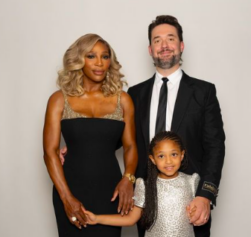At the beginning of her tennis career, Serena Williams was told that the big money was made outside of the court. Shifting that focus, Williams honed in on her sensation of winning a tennis match so much that she often forgot about the cash prize and had to be reminded to pick it up.

On April 30, in the Bloomberg podcast, “The Deal,” Williams told the hosts, retired MLB superstar Alex Rodriguez and its Bureau Chief of New York correspondent Jason Kelly, that at the start of her career, she would forget to claim her cash prizes after winning so many tournaments, to the point where her accountant had to remind her.
“When I started tennis, first of all, I’m from Compton, Calif., and I remember playing on these courts, and my life was great. I never felt like I needed anything. So for me, money was never a motivation,” Williams told the hosts.
She continued, “I remember when I first started, back in the day, they used to write out checks after you won your tournament. And I would always forget to get the checks. And so at the end of the year they would always have to say, ‘Serena, we have all these checks for you.’ I’m like, ‘Oh my God.’ And at the time, I had an accountant who would be like, ‘Serena. They sent me all these checks that you would forget to get from the tournaments.’”
The podcast features Serena discussing how her early financial lessons shaped her business success and how she brings the same ambition to her business endeavors. She stays closely involved in major decisions and is focused on building a trusted team.
Serena’s Business Mindset: Diversity in Venture Capital
Serena Ventures, a venture capital fund backed and founded in 2017, has invested in over 20 companies, focusing on those led by underrepresented founders, especially women and people of color.
The podcast goes in on her endorsement deals, including her fashion sponsors Puma and Nike.
Williams secured her first major endorsement deal with Puma in 1997 at age 16, ranked 99th, worth $12-13 million in a span of five years, with performance bonuses.
Puma designed her iconic on-court outfits, including the memorable black catsuit in 2002, the Bloomberg podcast discussed.
In December 2003, after winning ssix Grand Slam titles with Puma, Williams switched to Nike in a deal reportedly worth at least $55 million over eight years, ESPN reported. In 2013, she expanded her Nike deal, where she also had a brand designing her distinctive on-court looks at the time, and it was estimated at over $40 million.
Other deals include partners include Anheuser-Busch InBev, DirecTV, and Gatorade, in addition to Gucci, Subway, and Ford.
Williams has been retired from tennis since 2022, but has hinted that she has a desire to win one more championship, The Times wrote.
Since 1999, when she won the U.S. Open at 17, defeating top-ranked players like Martina Hingis, Serena has been a dominant force in tennis. Currently, at age 42, she is revered as a Black barrier breaker who is set to host the 2024 ESPYs in July, according to USA Today. Notably, it is expected that the show will spotlight female athletes, particularly those in the WNBA and NWSL.
According to the Women’s Tennis Association (WTA), Williams’ career prize money earnings total $94.8 million, making her the all-time leader in women’s tennis.
It is also more than double that of her sister, Venus Williams, who ranks second with $42.3 million.
Serena has achieved 23 Grand Slam singles titles, along with 14 doubles titles alongside her sister Venus, and two mixed doubles titles, all contributing to her record earnings.
In 2013, she made history by becoming the first female player to earn over $10 million in a single season, with her prize money surpassing $12.4 million.




